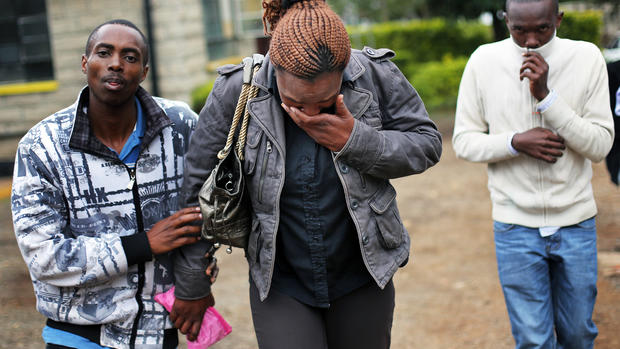Somalia: Islamic militants planning retaliation attacks
MOGADISHU, Somalia - Somalia's government has credible intelligence that Islamic militants are planning attacks following the death of their leader in a U.S. air strike Monday, a top official said.
In a televised speech Friday night, Gen. Khalif Ahmed Ereg, Somalia's national security minister, said targets including medical and educational institutions could be targeted. Ereg says the government is vigilant and prepared its armed forces to prevent such attacks.
President Barrack Obama confirmed Friday Ahmed Abdi Godane, the leader of al-Shabab, was killed by the U.S. airstrike.
Godane had publicly claimed al-Shabab was responsible for the deadly Westgate Mall attack in Nairobi, Kenya almost a year ago that left 67 people dead.
Al-Shabab has not issued any statements about Godane's death. The implications for al-Shabab following Godane's death are unclear. Some analysts predict a power struggle for the leadership that could splinter the group
Ereg described the killing of Godane as "delightful victory." He called on militants still fighting for the Al-Qaeda linked group to surrender to get a "brighter" livelihood from the government.
The U.S. State Department declared al-Shabab a terrorist organization in February 2008.
The Pentagon on Friday confirmed the death of Godane, who was the target of a U.S. airstrike Monday in Somalia.
The Pentagon's press secretary, Rear Adm. John Kirby, confirmed the death in a brief written statement. President Barack Obama, speaking at the conclusion of a NATO summit in Newport, Wales, said the successful U.S. strike was an example of his administration's determination to hit back at terrorists.
Obama said the U.S. would use the same approach in degrading the Islamic State group in Iraq and Syria.
"We have been very systematic and methodical in going after these kind of organizations" that threaten U.S. personnel and the homeland," Obama said. "That deliberation allows us to do it right, but have no doubt: We will continue to do what is necessary to protect the American people."
Godane, also known as Mukhtar Abu Zubeyr, is the group's spiritual leader under whose direction the Somali militants forged an alliance with al Qaeda.
The White House declared a counterterrorism success.
"Godane's removal is a major symbolic and operational loss to the largest al-Qaida affiliate in Africa and reflects years of painstaking work by our intelligence, military and law enforcement professionals," a White House statement said.
"Even as this is an important step forward in the fight against al-Shabaab, the United States will continue to use the tools at our disposal - financial, diplomatic, intelligence and military - to address the threat that al-Shabaab and other terrorist groups pose to the United States and the American people." It added.
U.S. officials had said after the strike on Monday that U.S. special operations forces using manned and drone aircraft had destroyed an encampment and a vehicle using several Hellfire missiles and laser-guided munitions. But they did not confirm that Godane had been killed until Friday.
CBS News correspondent David Martin reported that the operation involved no boots on the ground.
The State Department declared al-Shabaab a terrorist organization in February 2008.
Kirby said on Tuesday, before the Pentagon was certain that Godane had died, that the U.S. strike was conducted south of Mogadishu and that it had destroyed the vehicle that was targeted. He noted that in September 2013, Godone had publicly claimed al-Shabaab was responsible for the deadly Westgate Mall attack in Nairobi, Kenya.
"Under the leadership of Godane, al-Shabaab has claimed responsibility for many bombings, including suicide attacks in Mogadishu and in central and northern Somalia, typically targeting officials and perceived allies of the federal government of Somalia, as well as the former transitional federal government of Somali," Kirby said Tuesday.
